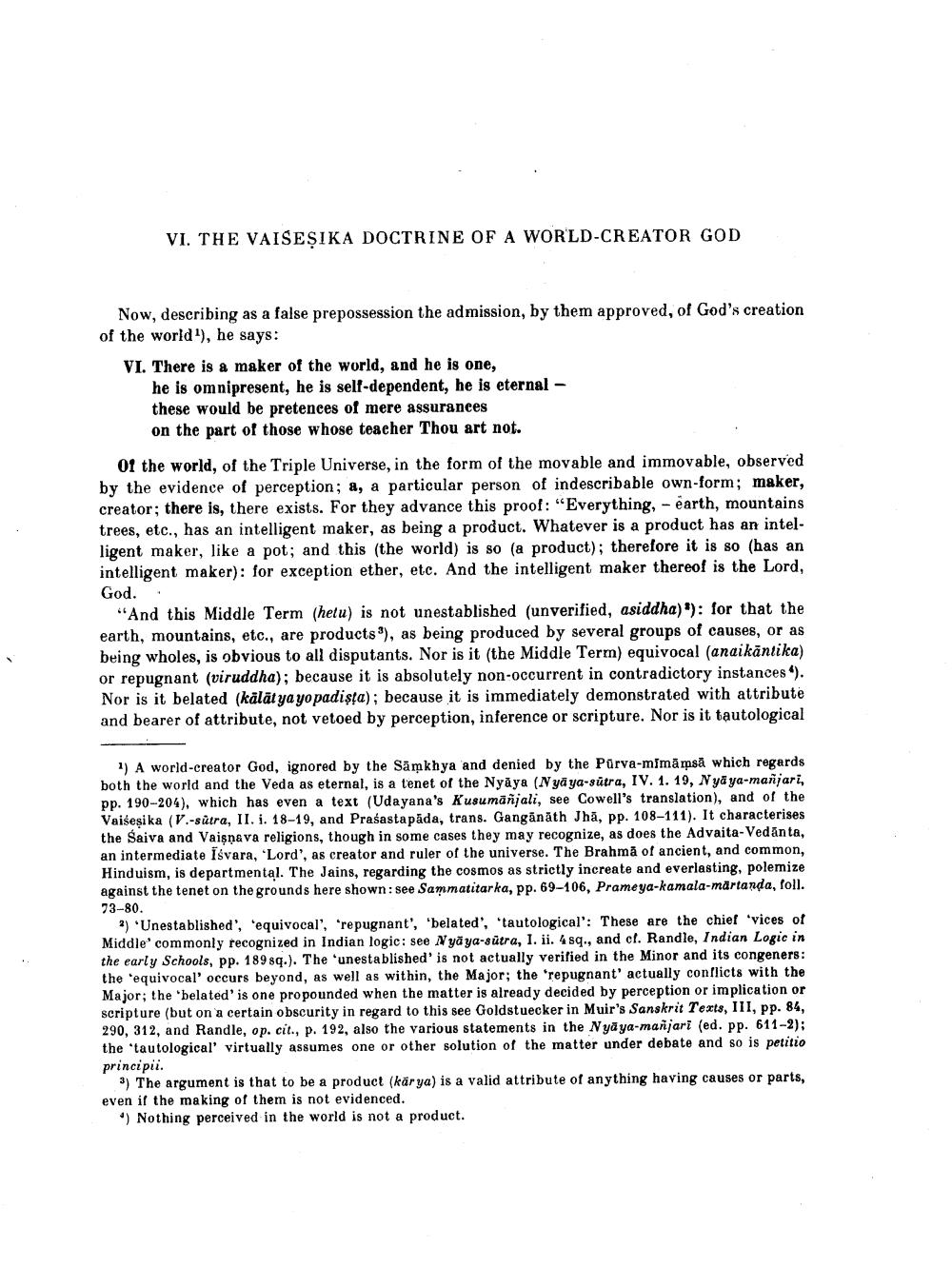________________
VI. THE VAISESIKA DOCTRINE OF A WORLD-CREATOR GOD
Now, describing as a false prepossession the admission, by them approved, of God's creation of the world1), he says:
VI. There is a maker of the world, and he is one,
he is omnipresent, he is self-dependent, he is eternal
these would be pretences of mere assurances
on the part of those whose teacher Thou art not.
Of the world, of the Triple Universe, in the form of the movable and immovable, observed by the evidence of perception; a, a particular person of indescribable own-form; maker, creator; there is, there exists. For they advance this proof: "Everything, - earth, mountains trees, etc., has an intelligent maker, as being a product. Whatever is a product has an intelligent maker, like a pot; and this (the world) is so (a product); therefore it is so (has an intelligent maker): for exception ether, etc. And the intelligent maker thereof is the Lord, God.
"And this Middle Term (hetu) is not unestablished (unverified, asiddha)): for that the earth, mountains, etc., are products 3), as being produced by several groups of causes, or as being wholes, is obvious to all disputants. Nor is it (the Middle Term) equivocal (anaikantika) or repugnant (viruddha); because it is absolutely non-occurrent in contradictory instances"). Nor is it belated (kälät ya yo padişta); because it is immediately demonstrated with attribute and bearer of attribute, not vetoed by perception, inference or scripture. Nor is it tautological
1) A world-creator God, ignored by the Samkhya and denied by the Purva-mimämsä which regards both the world and the Veda as eternal, is a tenet of the Nyaya (Nyaya-sutra, IV. 1. 19, Nyaya-manjari, pp. 190-204), which has even a text (Udayana's Kusumäñjali, see Cowell's translation), and of the Vaiseṣika (V.-sutra, II. i. 18-19, and Prasastapāda, trans. Gangānāth Jha, pp. 108-111). It characterises the Saiva and Vaisnava religions, though in some cases they may recognize, as does the Advaita-Vedanta, an intermediate Iśvara, 'Lord', as creator and ruler of the universe. The Brahma of ancient, and common, Hinduism, is departmental. The Jains, regarding the cosmos as strictly increate and everlasting, polemize against the tenet on the grounds here shown: see Sammatitarka, pp. 69-106, Prameya-kamala-märtanda, foll. 73-80.
2) 'Unestablished', 'equivocal', 'repugnant', 'belated', 'tautological': These are the chief 'vices of Middle' commonly recognized in Indian logic: see Nyaya-sutra, I. ii. 4 sq., and cf. Randle, Indian Logic in the early Schools, pp. 189 sq.). The 'unestablished' is not actually verified in the Minor and its congeners: the 'equivocal' occurs beyond, as well as within, the Major; the 'repugnant' actually conflicts with the Major; the 'belated' is one propounded when the matter is already decided by perception or implication or scripture (but on a certain obscurity in regard to this see Goldstuecker in Muir's Sanskrit Texts, III, pp. 84, 290, 312, and Randle, op. cit., p. 192, also the various statements in the Nyaya-mañjari (ed. pp. 611-2); the 'tautological' virtually assumes one or other solution of the matter under debate and so is petitio principii.
3) The argument is that to be a product (karya) is a valid attribute of anything having causes or parts, even if the making of them is not evidenced.
*) Nothing perceived in the world is not a product.




